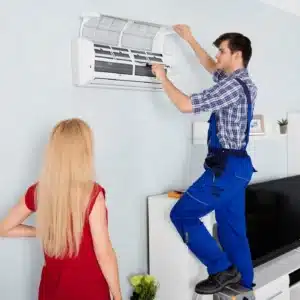Importance of HVAC Maintenance for Commercial Buildings
In Florida’s hot and humid climate, HVAC systems are essential...
The question of whether it’s detrimental for a home air conditioner to run continuously throughout the year is a common one. In this blog post, we’ll cut through the conjecture and provide you with factual information on the implications of running your home air conditioner 24/7, 365 days a year.
While modern air conditioning systems are designed to handle extended operation, running your AC continuously can lead to increased energy consumption. This can result in higher utility bills and put additional strain on the system, potentially affecting its efficiency over time.
Constant operation contributes to wear and tear on the various components of your air conditioning unit. Like any mechanical system, your AC has parts that undergo stress during operation. Running the system continuously without breaks for extended periods can accelerate the wear on these components.
Air conditioners are designed to maintain a set temperature, not necessarily to cool a space from high temperatures continuously. Running your AC round the clock might not provide additional cooling benefits, as the system is engineered to reach and maintain a specific temperature range efficiently.
Continuous operation without temperature adjustments can lead to overcooling, especially during milder weather conditions. This not only wastes energy but may also make your indoor environment uncomfortably cold.
Air conditioners play a crucial role in humidity control. However, running the system constantly might compromise its ability to effectively remove humidity from the air. Properly sized and periodically cycled AC units are more efficient in maintaining optimal humidity levels indoors.
While air conditioners are built to endure regular operation, continuous use without breaks can reduce the overall lifespan of the system. Periods of rest allow the components to cool down and relieve stress, contributing to the longevity of the unit.
Excessive energy consumption not only affects your utility bills but also has environmental implications. Conserving energy by optimizing your air conditioning usage aligns with eco-friendly practices.
While it’s possible for a home air conditioner to run 24/7, doing so may have consequences for energy efficiency, system wear, and overall longevity. The key lies in finding a balance that meets your comfort needs without unnecessary strain on the system. For personalized advice on optimizing your air conditioning usage or if you have concerns about your HVAC system’s performance, reach out to an expert HVAC company.

In Florida’s hot and humid climate, HVAC systems are essential...

Florida’s warm climate brings many advantages, but it also means...

When it comes to keeping your home comfortable in Florida’s...

In Florida’s hot and humid climate, a reliable air conditioning...

If your air conditioner has been chugging along since the...

Indoor air quality is a big deal, especially in commercial...